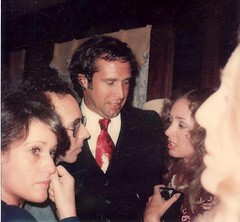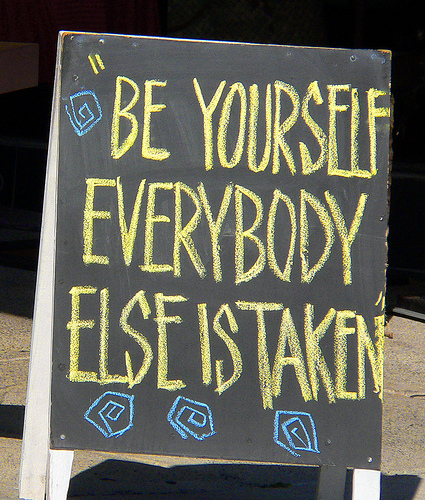You walk into a bar and the bartender asks, "So what'll it be tonight? Meaning or happiness?" "I'll take both," you say.
He laughs hard. "No, come on. Meaning or happiness?"
"Both," you repeat, unamused.
He abruptly stops smiling and stares you down. "You honestly don't get it, do you? You're gonna have to pick."
Welcome to the bar called Life.
And boy have I been feeling it lately.
A Foray Into a Meaningful, Unhappy Existence
As you probably haven't noticed in the crush of your busy life, I've been largely silent over the past week or so. No blog posts. Barely any social media presence. No newsletter that is now weeks overdue.
That's because I've been positively drowning in meaningful activities lately.
And totally miserable to boot.
Between intensive care of a molar-teething, potty-training, not-sleeping toddler; shepherding a gaggle of first year students into my Psychology 101 class; advising sophomores on their choice of classes, majors, and that little thing called life; helping senior students prepare mandatory proposals for their empirical theses (due today); attending meetings to improve purposeful work and student thriving on campus; and of course being fully present and available for my amazing, making-life-changes-as-we-speak coaching clients, it's been an "interesting" couple of weeks.
Don't get me wrong: everything I listed I have worked very hard to have in my life. They are all the product of intentional search. In fact, the list reads precisely like the vague vision I held in my mind over ten years ago when I quit my graduate program and stumbled confusedly into the woods of Maine.
In other words, every single thing I'm doing is deeply and urgently meaningful.
Then why have I been so gosh-darn unhappy recently?
The Meaning-Happiness Disconnect
As I'm wont to do, I looked to the research for an answer and, by golly, a study published in The Journal of Positive Psychology in August gave it to me.
The survey of 400 Americans indicates that if we want to be happy, it's likely we won't have as much meaning in our lives. If we want to pursue meaningfulness, it's likely we won't have tons of happiness.
That's because happiness and meaning arise from different sources. Which tend to be in conflict.
"Meaningfulness is associated with doing things for others. Happiness is associated with others doing things for oneself. Engagement with others that sacrifices the self or that builds relationships over time contributes to meaningfulness, but it has a negligible or negative link to happiness." - Psychologists Roy Baumeister, Kathleen Vohs, Jennifer Aaker, and Emily Garbinsky (2013)
To be fair, meaning and happiness overlap a good deal. In fact, "almost half of the variation in meaningfulness was explained by happiness, and vice versa," Baumeister writes in a recent insightful article in Aeon Magazine.
But that other half - the half that doesn't overlap - is highly telling. It hints at all of the choices and compromises we must make as we intentionally and purposefully construct our lives.
Where Meaning and Happiness Diverge
Baumeister and colleagues found five areas where happiness and meaning diverge:
- Getting What We Want and Need. "People are happier to the extent that they find their lives easy rather than difficult," Baumeister writes in Aeon. On the other hand, "the frequency of good and bad feelings turns out to be irrelevant to meaning, which can flourish even in very forbidding conditions."
- The Time Frame We Focus On. The old mindfulness adage about staying present to increase happiness is true. Thing is, being present-focused doesn't contribute to meaningfulness. The study showed that "the more time people spent thinking about the future or the past, the more meaningful, and less happy, their lives were."
- Social Life. Relationships contribute to both meaningfulness and happiness. That said, taking from social relationships increases happiness but reduces meaning, while being a giver is associated with meaning but not happiness. In fact, "helping others can actually detract from one’s own happiness." This especially seems to be the case in parenting. While parenthood has been frequently shown to reduce happiness, people still pursue and undertake the endeavor because it adds meaning to one's life.
- The Hard Times. Positive life events make us feel both happiness and meaning. It's the hard times of life that reveal a divide. "Stress, problems, worrying, arguing, reflecting on challenges and struggles — all these are notably low or absent from the lives of purely happy people, but they seem to be part and parcel of a highly meaningful life," says Baumeister.
- Identity. On this site I repeatedly emphasize the importance of finding work that expresses who you genuinely are. This is good advice in terms of increasing meaning in your life. But happiness? Not so much. "Even just caring about issues of personal identity and self-definition was associated with more meaning, though it was irrelevant, if not outright detrimental, to happiness." So, uh, I just decreased your happiness by asking you read this article...Sorry.
Why Meaning is Still Worth Pursuing
After reading all of this, you might be thinking, "Screw meaning. I'm going with happiness." And in my present condition, I can't say I blame you.
The thing is, life is about much more than right now. Our existence is dynamic; life's unpredictable curves are liable to snatch our present pleasures at a moment's notice. Not only that, but questing after present pleasures becomes a constant search, called the hedonic treadmill, in which we adjust to what we have and always desire more.
Meaning, on the other hand, is satiable and "more stable than emotion...so living things use meaning as part of their never-ending quest to achieve stability," Baumeister writes.
That's probably why meaning is associated with higher life satisfaction, better physical health, and even lower mortality rates.
Not that I'd advise living my life the way I have the past two weeks. Sleeping, eating healthy food sitting down, getting a moment or two to brush and bathe and be braindead - those things do matter. And while there not be a way to strike a genuine "balance" between meaning and happiness - as "balance" is an unattainable desire in most any domain of life - a tad of present pleasure goes a long way.
That said, in the Bar of Life, given the choice, I'd go for a thick swill of meaning any day.
"If your life had a purpose and you didn’t know it, you might end up wasting it. How sad to miss out on the meaning of life, if there is one." - Roy Baumeister, psychologist














